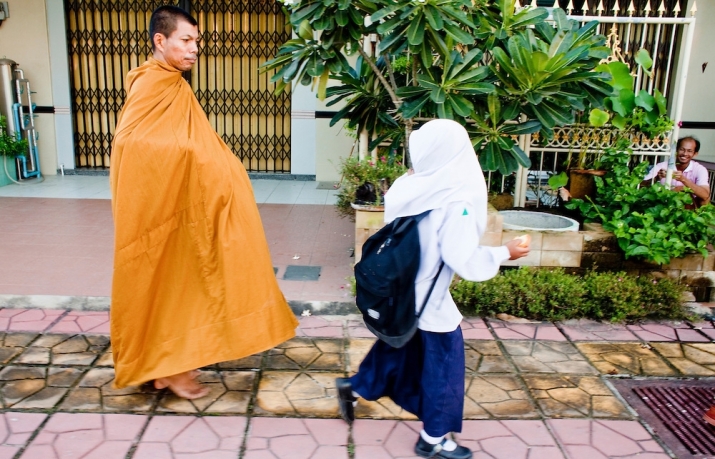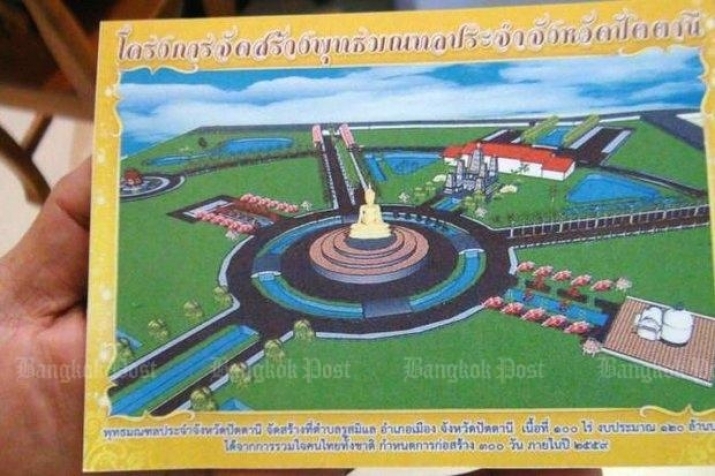NEWS
Muslim Leaders Object to Planned Buddhist Park in Southern Thailand
 A Thai Muslim girl walks past a Thai Buddhist monk in Pattani, Thailand. Photo by Jack Kurtz. From photoshelter.com
A Thai Muslim girl walks past a Thai Buddhist monk in Pattani, Thailand. Photo by Jack Kurtz. From photoshelter.comA plan by the local authorities to build a Buddhist park in Thailand’s southern province of Pattani has elicited protests from local residents and religious leaders, who urged that the scheme be reconsidered. Pattani is one of three predominantly Muslim provinces in southern Thailand, along with Narathiwat and Yala, which have been wracked by more than a decade of bloody conflict between state security forces and separatist insurgents.
A provincial advisory committee recently approved the construction of the park on 40 acres of land in the province at an estimated cost of Bt200 million (US$5.5 million). Objectors have criticized the plan for ignoring the religious sensitivities of the local population, of whom 80 per cent are Muslims.
Waedueramae Mamingji, chairman of the Pattani Islamic Committee and of the Network of the Islamic Committees of the Three Southern Border Provinces, said on Sunday that there had been no public hearing on the plan, which includes the construction of a large Buddha image, to gauge the opinions of local residents. He noted that the Muslim community in general recognized the basic right to freedom of religion and was not opposed to Buddhist temples being built. “We live like brothers and sisters and respect one another," he said. (Bangkok Post)
Waedueramae cautioned that construction of the park could lead to protests, adding that Muslim religious leaders had organized a meeting in neighboring Yala to discuss the matter.
 An artist's impression of the Buddhist park that the provincial authorities are planning for Pattani. Photo by Abdulloh Benjakat. From bangkokpost.com
An artist's impression of the Buddhist park that the provincial authorities are planning for Pattani. Photo by Abdulloh Benjakat. From bangkokpost.comFormer Pattani senator Worawit Bahru also urged the provincial authorities to rethink the plan, warning of profound social and even commercial ramifications. “Go right ahead [with the park] if the authorities are interested only in exercising their power,” he said, adding that Pattani had leveraged its identity as an overwhelmingly Muslim province to become an important producer and exporter of Halal foods. (Bangkok Post)
He backed Waedueramae’s call for a hearing on local opinion: “What purpose will the park serve? There are a number of other activities which can be initiated that promote Buddhism just as well.” (Bangkok Post)
Narathiwat, Pattani, and Yala once formed part of the historical Islamic kingdom of Patani. The Anglo-Siamese Treaty of 1909 between Britain and the Kingdom of Siam, which ceded control of the states of Kedah, Kelantan, Perlis, and Tringganu to Britain, confirmed Thai rule over the Patani region. From 1939–42, Thai military dictator Field Marshall Plaek Phibunsongkhram initiated a series of Cultural Mandates—edicts aimed at creating a uniform and “civilized” Thai culture—which included the cultural assimilation of the Patani people and other ethnic groups in the country.
By 1944, Thai civil law had been enforced throughout Thailand, including the Patani region, overriding earlier concessions to local Islamic administrative practices and displacing the traditional Muslim courts that had formerly handled civil cases. Dissatisfaction with the perceived imposition of Thai-Buddhist cultural practices led to a Patani nationalist movement, which grew rapidly during the 1950s and evolved into an insurgency. In response to the increasingly violent separatist movement, usually involving drive-by shootings or small bombings initiated by a number of separate insurgent groups, the Thai government placed the region under martial law in January 2004. According to data from the state Southern Border Provinces Administration Centre, between 2004 and 2012 the conflict resulted in the deaths of 2,316 civilians, 372 troops, 278 police, 250 suspected insurgents, 157 education officials, and 7 Buddhist monks.
See more
Conflict brewing over Buddhist park in South (Bangkok Post)
Muslim leaders question Buddhist park plan in Pattani (Bangkok Post)
Military Tightens Security for Buddhist Monks in Thailand’s South (Buddhistdoor Global)














